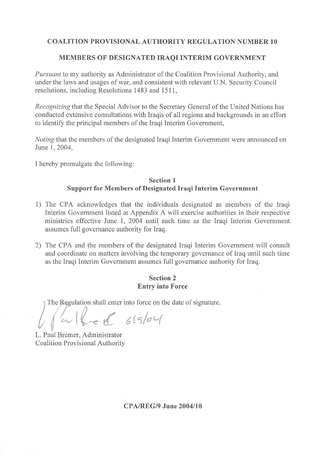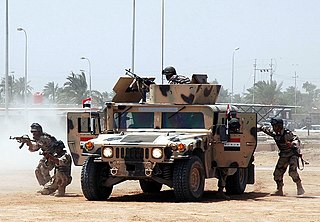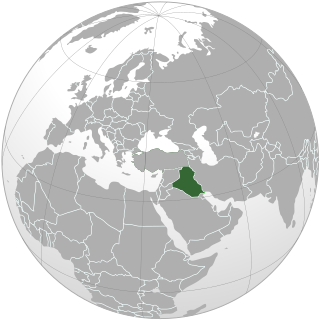
United Nations Security Council resolution 1546, adopted unanimously on 8 June 2004, after reaffirming previous resolutions on Iraq, the Council endorsed the formation of the Iraqi Interim Government, welcomed the end of the occupation and determined the status of the multinational force and its relationship with the Iraqi government.

United Nations Security Council Resolution 1700, adopted unanimously on August 10, 2006, after recalling previous resolutions on Iraq, particularly resolutions 1500 (2003), 1546 (2004), 1557 (2004) and 1619 (2005), the Council extended the mandate of the United Nations Assistance Mission in Iraq (UNAMI) for a further period of twelve months until August 10, 2007.

United Nations Security Council Resolution 1723, adopted unanimously on November 28, 2006, after recalling previous resolutions on Iraq, the Council extended the mandate of the multinational force until the end of 2007.

The United Nations Assistance Mission for Iraq (UNAMI) was formed on 14 August 2003 by United Nations Security Council (UNSC) Resolution 1500 at the request of the Iraqi government to support national development efforts.

United Nations Security Council Resolution 1917, adopted unanimously on March 22, 2010, after recalling its previous resolutions on Afghanistan, in particular resolutions 1868 (2009), 1662 (2006) and 1659 (2006), the Council extended the mandate of the United Nations Assistance Mission in Afghanistan (UNAMA) until March 23, 2011 and realigned its mandate to assist with government-led recovery efforts.

United Nations Security Council Resolution 1936, adopted unanimously on August 5, 2010, after recalling all previous resolutions on the situation in Iraq, including resolutions 1500 (2003), 1546 (2004), 1557 (2004), 1619 (2005), 1700 (2006), 1770 (2007), 1830 (2008) and 1883 (2009), the Council extended the mandate of the United Nations Assistance Mission in Iraq (UNAMI) for a further period of 12 months, until July 31, 2011.

United Nations Security Council resolution 1500, adopted on 14 August 2003, after reaffirming previous resolutions on Iraq, particularly Resolution 1483 (2003), the council established the United Nations Assistance Mission in Iraq (UNAMI) and welcomed the creation of the Iraqi Governing Council.

United Nations Security Council resolution 1507, adopted unanimously on 12 September 2003, after reaffirming all resolutions on the situation between Eritrea and Ethiopia, particularly Resolution 1466 (2003), the Council extended the mandate of the United Nations Mission in Ethiopia and Eritrea (UNMEE) until 15 March 2004.

United Nations Security Council resolution 1511 was adopted unanimously on 16 October 2003, after reaffirming previous resolutions on Iraq, particularly 1483 (2003), 1500 (2003), and Resolution 1373 (2001) on terrorism. The council urged countries to contribute towards a multinational force to maintain security and called for power to be returned to the Iraqi people as soon as possible.

United Nations Security Council resolution 1557, adopted unanimously on 12 August 2004, after reaffirming previous resolutions on Iraq, particularly resolutions 1500 (2003) and 1546 (2004), the Council extended the mandate of the United Nations Assistance Mission in Iraq (UNAMI) for a further period of twelve months. The resolution was drafted by the United Kingdom and United States.

United Nations Security Council Resolution 1574, adopted unanimously at a meeting in Nairobi, Kenya, on 19 November 2004, after recalling resolutions 1547 (2004), 1556 (2004) and 1564 (2004), the council welcomed political efforts to resolve the conflicts in Sudan and reiterated its readiness to establish a mission to support the implementation of a Comprehensive Peace Agreement.

United Nations Security Council Resolution 1590, adopted unanimously on 24 March 2005, after recalling resolutions 1547 (2004), 1556 (2004), 1564 (2004), 1574 (2004), 1585 (2005) and 1588 (2005) on the situation in Sudan, the Council established the United Nations Mission in Sudan (UNMIS) for an initial period of six months.

United Nations Security Council resolution 1619, adopted unanimously on 11 August 2005, after reaffirming previous resolutions on Iraq, particularly resolutions 1500 (2003), 1546 (2004) and 1557 (2004), the Council extended the mandate of the United Nations Assistance Mission in Iraq (UNAMI) for a further period of twelve months.

United Nations Security Council Resolution 1974, adopted unanimously on March 22, 2011, after recalling previous resolutions on Afghanistan, in particular 1917 (2010), the Council extended the mandate of the United Nations Assistance Mission in Afghanistan (UNAMA) for a period of one year until March 23, 2012.

United Nations Security Council Resolution 2001, adopted unanimously on July 28, 2011, after recalling all previous resolutions on the situation in Iraq, including resolutions 1500 (2003), 1546 (2004), 1557 (2004), 1619 (2005), 1700 (2006), 1770 (2007), 1830 (2008), 1883 (2009) and 1936 (2010), the Council extended the mandate of the United Nations Assistance Mission in Iraq (UNAMI) for a further period of 1 year.

The United Nations Support Mission in Libya (UNSMIL) is a United Nations (UN) advanced mission in Libya, created in the aftermath of the Libyan Civil War. UNSMIL is a political mission, not a military mission. The main elements of its mandate defined by the UN include supporting Libyan transitional authorities in "post-conflict efforts", providing mediation in implementing Libyan political agreements, supporting key Libyan institutions and monitoring and reporting on human rights. UNSMIL is led by the UN Department of Political Affairs.

United Nations Security Council Resolution 1830 was unanimously adopted on 7 August 2008.

United Nations Security Council Resolution 1883 was unanimously adopted on 7 August 2009.
United Nations Security Council Resolution 1806 was unanimously adopted on 20 March 2008.

United Nations Security Council Resolution 2110 is a United Nations Security Council resolution adopted unanimously by the United Nations Security Council on 24 July 2013, extending the United Nations Assistance Mission for Iraq until 31 July 2014 as stipulated in several previous resolutions The resolution signaled its intention to review the original mandate, as stipulated in UNSC resolution 2061 within twelve months.
















